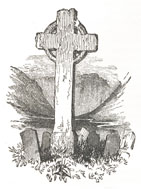Social State of Ancient Ireland
As might be expected, descriptions of the social state of ancient Erinn are of the most contradictory character; but there is a remarkable coincidence in all accounts of the physical geography of the island. The moist climate, the fertile soil, the richly-wooded plains, the navigable rivers, and the abundance of its fish,[9] are each and all mentioned by the early geographers. The description given by Diodorus Siculus of a "certain large island a considerable distance out at sea, and in the direction of the west, many days' sail from Lybia," if it applies to Ireland, would make us suppose that the Erinn of pagan times was incomparably more prosperous than Erinn under Christian rule. He also specially mentions the fish, and adds: "The Phoenicians, from the very remotest times, made repeated voyages thither for purposes of commerce."[1]
The descriptions of our social state are by no means so flattering; but it is remarkable, and, perhaps, explanatory, that the most unfavourable accounts are the more modern ones. All without the pale of Roman civilization were considered "barbarians," and the epithet was freely applied. Indeed, it is well known that, when Cicero had a special object in view, he could describe the Celtae of Gaul as the vilest monsters, and the hereditary enemies of the gods, for whose wickedness extermination was the only remedy. As to the "gods" there is no doubt that the Druidic worship was opposed to the more sensual paganism of Greece and Rome, and, therefore, would be considered eminently irreligious by the votaries of the latter.
The most serious social charge against the Irish Celts, is that of being anthropophagi; and the statement of St. Jerome, that he had seen two Scoti in Gaul feeding on a human carcass, has been claimed as strong corroboration of the assertions of pagan writers. As the good father was often vehement in his statements and impulsive in his opinions, he may possibly have been mistaken, or, perhaps, purposely misled by those who wished to give him an unfavourable impression of the Irish. It is scarcely possible that they could have been cannibal as a nation, since St. Patrick never even alludes to such a custom in his Confessio,[2] where it would, undoubtedly, have been mentioned and reproved, had it existence.

Cross at Glendalough
Notes
[9] Fish.—And it still continues to be a national article of consumption and export. In a recent debate on the "Irish question," an honorable member observes, that he regrets to say "fish" is the only thing which appears to be flourishing in Ireland. We fear, however, from the report of the Select Committee of the House of Commons on the question of Irish sea-coast fisheries, that the poor fishermen are not prospering as well as the fish. Mr. Hart stated: "Fish was as plenty as ever; but numbers of the fishermen had died during the famine, others emigrated, and many of those who remained were unable, from want of means, to follow the pursuit." And yet these men are honest; for it has been declared before the same committee, that they have scrupulously repaid the loans which were given them formerly; and they are willing to work, for when they can get boats and nets, they do work.These are facts. Shakspeare has said that facts are "stubborn things;" they are, certainly, sometimes very unpleasant things. Yet, we are told, the Irish have no real grievances. Of course, starvation from want of work is not a grievance!
Within the few months which have elapsed since the publication of the first edition of this History and the present moment, when I am engaged in preparing a second edition, a fact has occurred within my own personal knowledge relative to this very subject, and of too great importance to the history of Ireland in the present day to be omitted. A shoal of sprats arrived in the bay of ------, and the poor people crowded to the shore to witness the arrival and, alas! the departure of the finny tribe. All their nets had been broken or sold in the famine year; they had, therefore, no means of securing what would have been a valuable addition to their poor fare. The wealthy, whose tables are furnished daily with every luxury, can have but little idea how bitter such privations are to the poor. Had there been a resident landlord in the place, to interest himself in the welfare of his tenants, a few pounds would have procured all that was necessary, and the people, always grateful for kindness, would long have remembered the boon and the bestower of it.
[1] Commerce.—"Phoenices a vetustissimis inde temporibus frequenter crebras mercaturae gratia navigationes instituerunt."—Diod. Sic. vers. Wesseling, t. i. p. 344.
[2] Confessio.—Dr. O'Donovan states, in an article in the Ulster Archaeological Journal,vol. viii. p. 249, that he had a letter from the late Dr. Prichard, who stated that it was his belief the ancient Irish were not anthropophagi. He adds: "Whatever they may have been when their island was called Insula Sacra,there are no people in Europe who are more squeamish in the use of meats than the modern Irish peasantry, for they have a horror of every kind of carrion;" albeit he is obliged to confess that, though they abuse the French for eating frogs, and the English for eating rooks, there is evidence to prove that horseflesh was eaten in Ireland, even in the reign of Queen Elizabeth.
